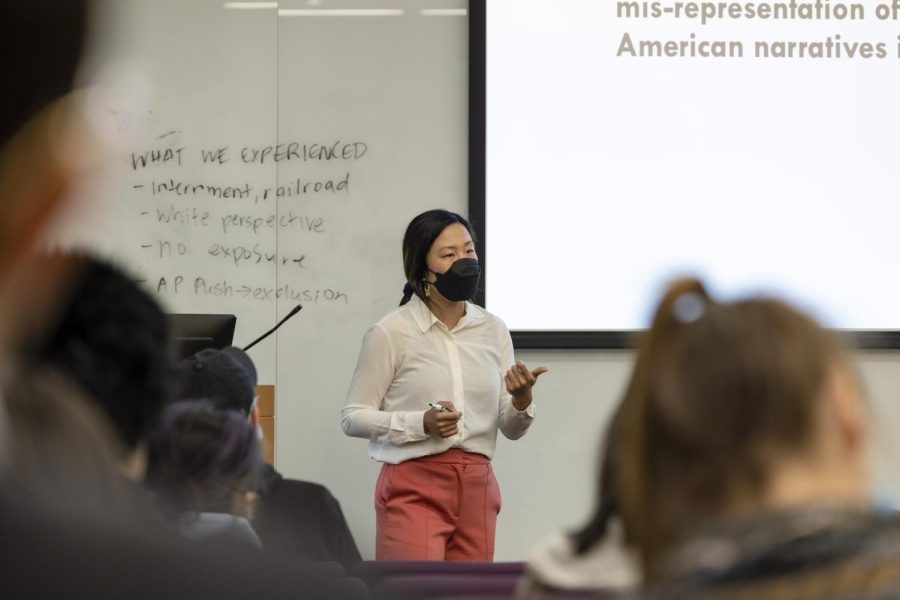Researcher Helen Lee speaks on incorporating Asian American voices into critical racial consciousness and education
Ava Mandoli/The Daily Northwestern
Helen Lee spoke on Tuesday about the importance of identity in education.
April 26, 2022
University of Chicago researcher Helen Lee spoke on how schools can support developing critical racial consciousness for Asian American youth at a Tuesday event hosted by the Asian American Studies Program.
“(We need to push a) curriculum that really challenges harmful stereotypes about Asian Americans,” Helen Lee said. “There needs to be more structural administrative support around the kind of changes that young folks are pushing for.”
Helen Lee’s research surveyed Asian American high school students in Chicago about their experiences in the public school system. With the exception of a few classes, she said most people did not get a chance to learn much about Asian American history.
Even when Asian American history was presented, Lee said students told her the lens was typically eurocentric. She said many students wanted to see their stories reflected.
“I was not exposed to Asian American history,” Helen Lee said. “Being surrounded by a predominately white community, I was hyperaware of my skin color, but I often didn’t have the spaces to process my racialized experiences.”
SESP senior Joanne Lee, who attended the event, said she wasn’t exposed to any Asian American history during her Chicago public school education. Her first experiences in Asian American studies came in college.
Joanne Lee said the erasure of Asian American history in K-12 school muted part of her own identity.
“Going to a public school, you’re taught that whatever you do learn is essential and prepares you,” she said. “The fact that I never learned any Asian American history just baffles my mind.”
Helen Lee said many young people she interviewed said they felt “wiped out” of the curriculum, and others said they didn’t have a say in the curriculum they were given.
Some students Helen Lee spoke to in her research said they thought exposure to Asian American curriculum should start earlier. She said this learning is important for students from all racial backgrounds, as changing perspectives can become more difficult over time. A tenth grade student Helen Lee surveyed said it’s crucial to educate the younger generation and broaden perspectives early.
“I feel like they should have taught me more about history, especially my history and other people’s history,” the student said. “(So that) when we grow up, and we go into high school, and we see more people and meet more people, we could think for ourselves.”
Helen Lee then placed participants into groups where they could discuss ways to incorporate Asian American voices into educational settings early on. Teams proposed ideas like assigning texts by Asian American authors, making space for Asian Americans in elementary education and providing more open forums for identity-based discussions.
Weinberg sophomore Lena Rhie, an event participant, said hiring more Asian American teachers while supporting existing initiatives can improve the system. By majoring in Asian American Studies at Northwestern, Rhie said she has come to learn a lot more about herself and hopes others can have similar experiences earlier in their lives.
“I feel a lot more knowledgeable in my own cultural history and also pan-Asian cultural history,” Rhie said. “What’s been more valuable for me is seeing other people care enough to teach it and the people I’ve been able to meet. It’s incredible.”
Correction: Helen Lee grew up in a predominantly white community. A previous version of this story misstated the demographics of her hometown. The Daily regrets the error.
Email: [email protected]
Twitter: @joannah_11
Related Stories:
— “East of California West of New York” features Midwestern, Asian American stand-up comedians
— SASA hosts its annual production featuring South Asian performance groups


